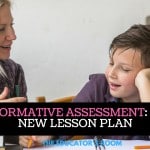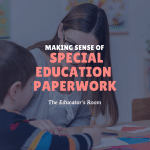This is the fourth piece in my series about formative assessment. Formative assessment is a tool used by many teachers in classrooms to move each student forward in learning. This series is to encourage and challenge teachers to think about the practices involved in this practice. Setting clear objectives, which goes beyond posting them in student friendly language, and using student success criteria are practices I have already discussed in this series. This week we will focus on peer feedback.
Peer feedback is a practice that teaches students to have meaningful conversations with their peers about student work. It provides students with opportunities to think about their peers work and give feedback on what they are noticing. This practice must be explicitly taught, modeled, and reviewed with students to be successful. Last year I focused on purposefully using peer feedback with my fourth graders and I was very pleased with our results.
Many elementary classrooms use peer feedback with writers workshop. Students are asked to review writing and edit with their peers. This is a start to the process, but it can be used across the curriculum with any subject and many other types of work. Students can learn to discuss objectives and review work with peers to provide feedback and give ideas to strengthen the learning of everyone. Through the process, you can learn where your students are in their own learning and what else they need to move forward towards the classroom goals, formative assessment.
The teacher’s role is this practices is to ensure students are successful in engaging with peers and providing meaningful feedback during this process. As with anything, it takes time to develop the skills students will use for feedback. When you have clear learning objectives and success criteria set forth, students can provide feedback to peers.
Start with classroom conversations. Look at samples of work you have created or saved from past years (student names removed) and move on to samples of student work from this year. I ask permission to share with the class being very honest that we will be looking for compliments and feedback to push their learning. If you have a document camera or airscanner on your device, you can display the work on your board. As a class go through the process together until students are ready to try it on their own. You can use dry erase boards or scratch paper to involve students in writing compliments and feedback. This is as much a writing process as it is an oral communication process. Students will be able to use this in their own work to self-evaluate as well.
This is the process I have students follow when giving feedback.
- Identify the objective or learning goal
- Often times we do this step together before they pair up for feedback.
- Switch samples and review the work independently
- Write a compliment on the work or on a sticky note
- I require students to use vocabulary from the learning objective for this step.
- Give feedback on the work or on a sticky note
- I have students use the words “Remember to” or “Next time you could try”.
Peer feedback allows students to review peer work. It does not, however, just happen on its own. Practice together until students are able to identify the learning objective for the assignment (these may be posted in your room as well to help), write a compliment that is meaningful using vocabulary from the objective/lesson/unit, and then provide some type of feedback for the student to use or to push them forward in learning. The complement should be specific to the objectives. The feedback should either help them correct an error/misconception or challenge them to think about the next step in learning. Peer feedback allows you to understand the learning of each student.
What does this look like in a classroom? My students used this in all subject areas last year, but we used it in writing and math the most. Students were able to look at projects and stories to find the 6-traits of writing, main idea, dialogue and provide feedback on writing processes. They shared math problems and discussed learning in computation. For a science project they created a pan flute and then did an art walk leaving feedback about how the flutes would work based on their knowledge of vibrations. This information allowed me to see their understanding and learning.
Where are you with peer feedback? If you have not started, pick a subject you love and focus there. If you are using peer editing in writing, move onto another subject. The peer assessment task should be structured to support all students. It should have a positive impact on the quality of all student work due to high quality feedback and structures put in place. You will be able to use the information, both written by students and overheard as you monitor, to know where your students are in their learning.






Leave a comment